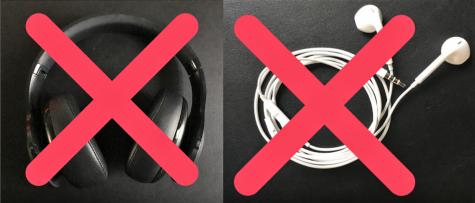The Headphone Policy

No headphones or earbuds in hallways or classrooms.
The new headphone policy is in effect at Kingsway! The rules are simple: no headphones or earbuds in the hallways or classrooms, period! This new policy has stirred up controversy over the benefits it brings and the freedoms it takes away. Principal Melvin Allen stated, “The goal of the policy is safety.” He said that students may be distracted in the hallways, and one time is all that matters during an emergency.
Principal Allen wanted students to understand the policy. He said “I don’t know who is listening and who isn’t. I need to keep everyone safe and that is why the policy is in place.” Students responded to the policy with contrasting views. Students supporting the headphone policy, such as sophomore Michael Parker, stated, “It was taken away for a just reason as people were not hearing the emergency signals they should have heard.” Other students who have different opinions to the new policy, like sophomore Bhavana Chamarthi, believe in the benefits of music: “Headphones should be allowed in school because music helps a lot of people get through the day.” Opinions vary across the school between administrators, teachers, and students; however, is the policy truly necessary or not?
The Benefits:
The new headphone policy at Kingsway provides benefits for students whether they realize or not. For example, the headphone policy keeps students safe during emergency events. A study done between 2004 and 2011 by Dr. Richard Lichenstein, Director of Pediatric Emergency Medicine Research at the University of Maryland, supplied evidence that there were “116 reported deaths or injuries of pedestrians wearing headphones” (Lichenstein). Although this is a relatively low number compared to the millions of people who roam the streets, Kingsway cannot afford to risk students lives in an already dangerous situation. The headphone policy works to eliminate the dangers and keeps students safe. In addition, a study by researchers from the Applied Psychology Department of Cardiff Metropolitan University found a multitude of benefits from quiet school environments. They analyzed performance during complex tests that involved revising passages on four groups of students: students with no music, the music they enjoyed, the music they disliked, and music without lyrics. Their study shows that “Students who revised in quiet environments performed more than 60% better in an exam than their peers who revised while listening to music that had lyrics” (Busch).
The Negatives:
Although students have higher academic performance and are safer in school, the implementation of the new headphone policy gives students less freedom and contributes to an increase in stress. An article written by Dr. Peter Gray supported the necessary development of more freedom within public school systems. Gray believes that an environment with freedoms and independence benefits a student’s education more than ever. He states, “We could make life better for children and improve learning, at much less expense than our current schools cost, if we developed environments in which children can play safely, interact freely with a wide range of others, and pursue their own interests” (Gray). The new headphone policy adds one more limiting factor on students who want to do what they feel is necessary for them, in this case listening to music. Furthermore, a study done by Nawaz Ahmad, a visiting professor at Iqra University, links listening to music with an increase in happiness. Ahmad concludes that “Music is increasingly being used to enhance well-being, reduce stress and distract patients from unpleasant symptoms” (Ahmad). Students have lost access to a form of stress relief they find in music which creates tension and anxiety throughout the student body. Nawaz Ahmad further writes, “People love listening to music, music is a source to soothe the soul. It has been proved by the research the people who listen to music are more relaxed” (Ahmad).
Overall, the headphone policy at Kingsway is clearly stated in the handbook and research backs up the policy. Its benefits of student safety and increasing academic performance are contributing factors to its practicality and widespread implementation. Although students are losing some freedoms, a quiet, calm classroom environment can be just as rewarding.
Works Cited
Ahmad, Nawaz. Impact of Music on Mood: Empirical Investigation. 2015, Impact of Music on Mood: Empirical Investigation, papers.ssrn.com/sol3/papers.cfm?abstract_id=2696883.
Busch, Bradley. “Drowned in Sound: How Listening to Music Hinders Learning.” The Guardian, Guardian News and Media, 14 Mar. 2018, www.theguardian.com/teacher-network/2018/mar/14/sound-how-listening-music-hinders-learning-lessons-research.
Gray, Peter. “Learning Requires Freedom.” Psychology Today, Sussex Publishers, 9 July 2008, www.psychologytoday.com/us/blog/freedom-learn/200807/learning-requires-freedom.
Lichenstein, Richard. Headphone Use and Pedestrian Injury and Death in the United States: 2004–2011. 2011, Headphone Use and Pedestrian Injury and Death in the United States: 2004–2011, injuryprevention.bmj.com/content/early/2012/01/03/injuryprev-2011-040161.
